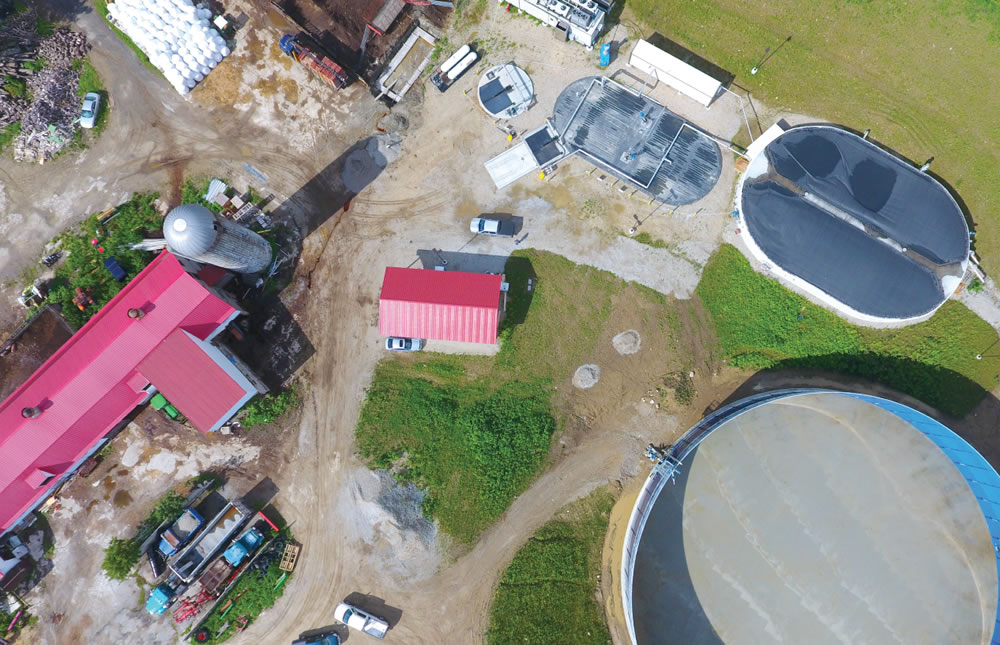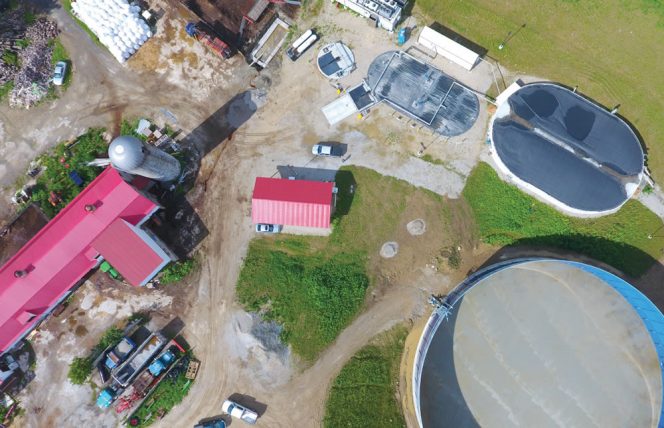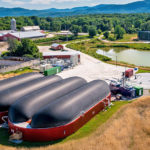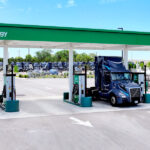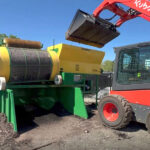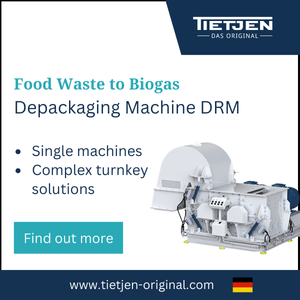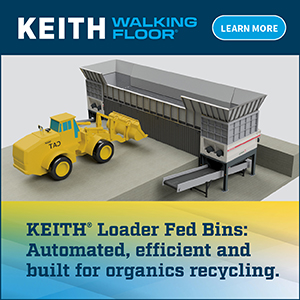Nora Goldstein
BioCycle January 2019
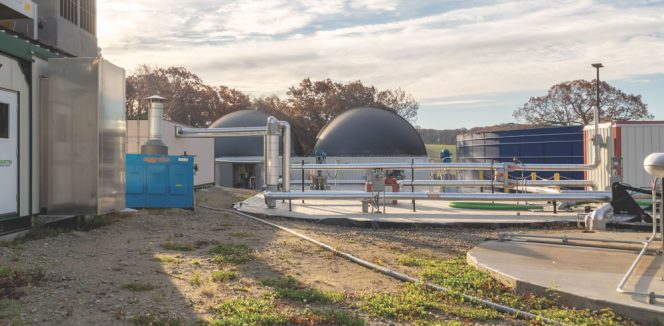
Vanguard’s newest digester is at Crescent Farm in Haverhill, Massachusetts. The two tanks with black tops are the digesters. At left is the building housing a 1 MW engine. Power will be sold to a local municipality. Photo courtesy of Vanguard Renewables
Vanguard Renewables, based in Wellesley, Massachusetts, was recently named 2018 Organics Recycler of the Year by the National Waste & Recycling Association. The award “recognizes the substantial contribution that Vanguard’s Farm Powered organics recycling and renewable energy production program is making to protect the environment and advance the waste and recycling industry,” stated the press release. With its recently opened farm digester in Haverhill, Massachusetts, Vanguard has capacity to manage 490 tons/day of food waste and 120 tons/day of dairy manure.
“No one was more surprised than us to get this award,” says John Hanselman, Chairman and CEO of Vanguard Renewables. “We have quietly put together five farm-based digesters to codigest food waste and manure. Getting a little recognition is great.”
To date, Vanguard’s four operating digesters and a fifth one under construction (see “Facilities” in main menu at link) van are on farms in Massachusetts. The company builds, owns and operates the digesters, managing the manure on those farms. The dairies receive a lease payment and utilize free heat recovered from the combined heat and power engines, as well as free fertilizer.
“The joy of developing projects in Massachusetts is that virtual net metering was established under the Green Communities Act around 2005,” explains Hanselman. “It allows digester biogas systems to virtually transmit their electrons and credits across the state, but the power can only be sold within a service territory of a specific utility. As a result, Vanguard can take excess power from the farm and sell it to generators that are sending food waste to us, such as Cabot Creamery. In the case of our newest facility at Crescent Farm in Haverhill, all the power will be sold to a local municipality.”
Interestingly, another anaerobic digester developer had proposed a food waste digester in Haverhill a few years ago and ran into significant public opposition. The site was in an industrial park in the same area as a waste-to-energy facility. There were community complaints about the incinerator, mostly related to odors and particulates. The public perceived the digester as being a similar type of facility, and was never sited. “At the ‘power-up’ grand opening, the Mayor of Haverhill cited that situation,” says Hanselman. “We were able to find a different incarnation that actually received community support. Locating on a farm and reducing odor by processing 100 percent of the manure is a positive. We had about 10 neighbors show up for each of the different public hearings, and they spoke up in favor of our project. We received a unanimous vote from the Haverhill Board of Health for the site license.”
Project Model
The first two facilities in Vanguard’s portfolio — Jordan Dairy and Longview Farm — utilized the quasar energy group and RCM anaerobic digestion systems, respectively. For the third digester, and the subsequent ones, the company has used a digester system provided by CH Four Biogas (based in Ontario, Canada). “We were looking for a system that was more ‘cookie cutter’ versus having to be individually crafted,” explains Hanselman. “The technology has been extremely effective for Vanguard as the system architecture is very robust. We have cycled these digesters with a lot of feedstock and a little feedstock, with organics that are energy rich and sometimes very dilute, and we get good, consistent results. As owners and operators, what we yearn for is predictability because we know the food waste streams will never be consistent. Getting consistent production through the systems is key.”
The dairy farms utilize the separated solids as bedding for their cows. One dairy, for example, switched from using wood chips for bedding to digested solids, and saw a significant reduction in the herd’s somatic cell count (which yields a higher price for the milk). The effluent is land applied on the farms’ acreage.
Vanguard plans to expand next into New York and Pennsylvania. “What has been critical is building a model that allows us to move all of our team and assets collectively south and west so that we are not doing one-off projects,” he adds. “We are consistently adding capacity for our new and existing customers.”
An exception to that market expansion strategy was made due to a partnership opportunity in Vermont with Middlebury College, Goodrich Family Farm in Salisbury and Vermont Gas. Under the terms of an agreement signed in 2017, Vanguard Renewables will construct, own and operate an anaerobic digester facility at Goodrich Family Farm that will produce renewable natural gas (RNG). The RNG will travel by a Vermont Gas pipeline to Middlebury College’s main power plant. The college has agreed to purchase the bulk of the facility’s RNG output — 100,000 Mcf/year of the digester’s anticipated production of 140,000 Mcf/year of RNG. (1 Mcf is equivalent to 1,000 cubic feet of RNG.)
Located on more than 2,200 acres, the Goodrich Family Farm is a generational dairy farm with 900 milking cows. The digester will process 100 tons/day of manure from the farm and 165 tons/day of food waste sourced by Vanguard Renewables. The farm receives an annual lease payment for hosting the AD facility, along with free heat and bedding for farm use. The digester project is in the permitting phase and expected to be operational by the end of 2019. Once permits are in place, Vanguard will begin construction and Vermont Gas will initiate work on a 5-mile pipeline that connects Goodrich Family Farm with its pipeline network in Addison County.
The Vermont project will give Vanguard experience in producing RNG instead of power. “We’ve yet to find the holy grail with RNG and tapping into the markets for RINs (federal program) and Low Carbon Fuel Standard credits (California), even though we’ve been investigating and evaluating it for a while,” notes Hanselman. “It is very complex, and many companies like ours are figuring out how to do it, who will play what role in the financing structure, and settle on the correct allocation of monies. Based on my experience on the solar energy side when it was in its infancy, I’d give it about 18 months until everyone figures out who’s who in the zoo. All of the players still think they are adding the most value.”
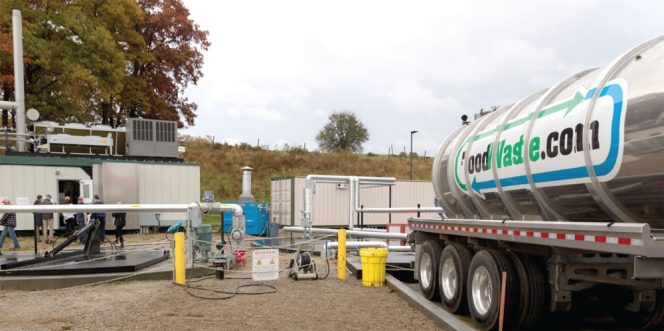
Slurried food waste is delivered in tanker trucks to Vanguard’s Farm Powered digesters. The company leases two tanker trucks (one shown above) to do its own collections, in addition to receiving loads from other haulers. Photo courtesy of Vanguard Renewables
Food Waste Flow
Vanguard receives slurried food waste at its farm-based facilities from a variety of haulers. It also leases two tanker trucks that are used for more “special” loads not handled by the other haulers. The company is permitting two depackaging facilities in Massachusetts — one in the western part of the state and the other north of Boston to increase the quantity of food waste diverted to its digesters.
Hanselman adds that any company trying to do large-scale food waste recovery has to have capacity to handle all organics streams, not just clean liquids with a few solids. “Generators simply want you to show up and take it. We had the luxury in the early days to get clean streams, but now there are more players competing for that food waste. Realistically, as an industry, we should not put that [separation] burden on the generators. We should charge differential pricing, but companies like ours should be able to take all types of loads containing organics.”
Having multiple digesters in central and western Massachusetts gives Vanguard Renewables the insurance that if one digester is down, it has other facilities that can receive the food waste. “Having backup is super critical,” says Hanselman. “If we didn’t have redundancy in our processing capacity, the generator gets stuck with having to find an alternative outlet. Our goal from the outset was to beat that. We always have enough AD capacity.”


